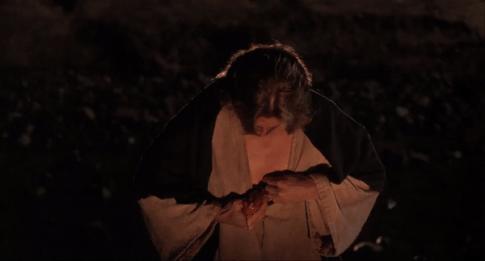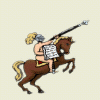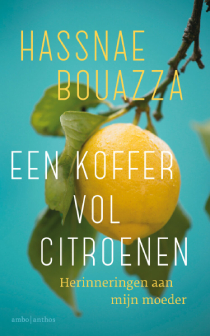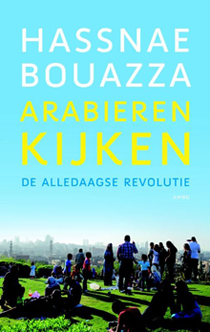Fighting for Islam
Tayfun Balçik

Scène uit The Last Temptation of Christ
Last month blogger and historian Tayfun Balçik interviewed Bangladeshi writer and activist Parvez Alam in front of a live audience as part of the The Hague Peace Projects. Alam is an expert in the history of Islam, especially the historical development of Islam. During the talk, a transcription of which will be published in four installments (read the first installment and the second), several subjects were explored, like the relationship between Arab nationalism and Islam and the roots of the Sunni-Shia divisions.
A question from the audience: From a religious point of view, theologians consider the emergence of islam not dynamic at all. But did Islam not submerge from contacts between traders with different religious backgrounds?
“The origin of Islam is a very complex process, and quite obscure, there are a lot of things we don’t know, the traditional history is totally embellished by Muslim historians. But what I can tell you, what I can vouch for, Muhammad’s religion was very personal, and his was a very small cult.”
“When Muhammad had to flee from Mecca to Medina, they came to live together with Jewish people, who already had a monotheistic tradition. Also the Arabs of Medina were not unfamiliar with prophetic traditions and they were probably anticipating a messianistic prophet amongst themselves. During Muhammad’s lifetime and thereafter a new idea developed that God had chosen Muhammad as the prophet of the Arabs. You have to understand as well that we are talking about a time brimming with messianic and apocalyptic predictions. The Jews in Arabia were at the forefront when Muslims were conquering Syria, because they thought this would get them Jerusalem back. During the time of the second caliph the Muslims conquered Jerusalem and Jews called the caliph Umar ‘Farouq’, the redeemer. Umar also thought about himself as some kind of redeemer, the one who came just before the original messiah.”
“Meanwhile there was geopolitical dimension too. The Jemenite Jews thought they would get their own kingdom somewhere, but that didn’t work out. The Islamic civil war was also a war between the Syrian Christians and Yemenite Jews. And the Syrian Christians were fighting for Muawiyya and the Yemenite Jews were fighting for Ali. Now the Muslim historians call all these people Muslim, but what did you have to do to become a Muslim back then? To confess that Muhammad is also a prophet in the Abrahamic tradition, that’s all. The so called Muslim canon didn’t exist yet, and even the Quran had just recently been compiled.”
So those early days of Islam is full of political strife and clans fighting each other for power. In addition to the sectarian division, what about ethnicity? The Persians became more or less Shia and the Arabs Sunni. How did this happen?
“Ali and his family had ties with the Persians. Hussain was married to the Persian royal family. But what I’m going to tell you know is more important. The first civil war ended with the defeat of Ali and Syria became the centre of the Islamic world. Muawiyya became the caliph, and after that the caliphate became a dynasty. Before that it was no dynasty. All Caliphs were coming from the Quraysh tribe, but it was no dynasty. With Muawiyya it became the Ummayad dynasty. They ruled for almost a hundred years, from Syria. Meccah and Medina were not politically important anymore. So during their rule there was another civil war, when Muawiyya died. Ali (who was a cousin and son in law of Muhammad) had two sons (Muhammads grand children) who also claimed the caliphate. First Hasan and then Husain. Hasan was poisoned during a time of peace. And Husain was killed in the desert, there are varying numbers, but 72 members of the prophets family, including babys, were killed.
By whom?
“By the Ummayad caliphate. There were two other family members who were prominent at that time. One was Husain’s son. But he totally retired from politics, he realized at that time, that he didn’t want bloodshed. And Ali had another son, not through Mohammad’s daughter Fatima, but he had other wives. Mohammad Hanafiya, he became the leader of Muhammad’s family. Muhammad’s clan is called the Hashemite clan. And they fought with the Umayyad clan. The Hashemite loyalists were also the first leading Shia group. But they didn’t specifically support specifically Ali and Fatima’s children at the time. They also supported Ali’s other son, Muhammad Hanafiya, who was not one of the grand children of Muhammad.
The Persians and Turks were called mawali, clients. You had to be a client of the Arabs. You became a Muslim, but you were seen as a mawali. During this time, the Persians who were already Muslim, had to pay the jizia, the tax for non-Muslims. So during the Ummayyad time, we see Arab supremacy in the Muslim-relationships.
The Ummayyad Islam was a very Arabic imperialist kind of Islam. The rebels from the prophet’s family, who were fighting the Umayyads, became very popular in Persia. The Persians thought that through the prophet’s family they could get there freedom back, and the prophet’s family would come to power again. That’s how the whole Shia messianism originated, the belief that one member of the prophet’s family would rise and become the caliph and peace and justice will come back.
There was a successful Shia rebellion in the year 750. But that wasn’t instigated by the Ali bloodline, The Hashemites succeeded under the Abbasid clan, they were from the bloodline of the prophets other cousin, Abdullah Idn Abbas. The Abbasid power base was in Iraq, Iran and Afghanistan. And this was also a fight between the Arabs and non-Arabs, which eventually the non-Arabs won.
To be concluded.
Tayfun Balçık is a historian, specialized in the modern history of Turkey and Amsterdam-West, one of the project-coordinators of the Turkish-Kurdish dialogue program at The Hague Peace Projects and he gives Dutch language lessons to Turkish elderly people. He has a Facebook-page.






 RSS
RSS